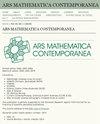关于小型研讨会的问题
IF 0.9
3区 数学
Q3 MATHEMATICS
引用次数: 0
摘要
广义Oberwolfach问题要求将完全图$K_v$分解为规定的$2$ -因子和最多一个$1$ -因子。当所有$2$ -因子成对同构且$v$为奇时,我们就得到了经典的Oberwolfach问题,它最初被表述为座位问题:假设会议上有$v$个与会者,其中有$t$张圆桌,其中$i$张圆桌可容纳$a_i$人,${\sum_{i=1}^t a_i = v}$张圆桌可容纳人,请在会议的$\frac{v-1}{2}$天内找到一个座位安排,使每个人恰好挨着另一个人坐一次。在本文中,我们引入了相关的{\em迷你研讨会问题},该问题要求求解$v$顶点上的广义Oberwolfach问题,该问题包含$m$顶点上的子系统。也就是说,限制到所需$m$顶点的分解是$m$顶点上广义Oberwolfach问题的解。在上面的座位环境中,较大的会议包含一个由$m$参与者组成的小型研讨会,并且我们还要求这些$m$参与者在$\left\lfloor\frac{m-1}{2}\right\rfloor$天内成对地坐在一起。当周期尽可能长,即$v$, $m$和$v-m$时,Hilton和Johnson的灵活方法提供了解决方案。当$v \equiv m \equiv 2 \pmod 4$和所有周期长度均为偶数时,我们使用此结果提供进一步的解决方案。此外,我们在所有周期长度等于$k$的情况下提供了广泛的结果,解决了$m\mid v$的所有情况,除了$k$为奇数和$v$为偶数的可能情况。本文章由计算机程序翻译,如有差异,请以英文原文为准。
On the mini-symposium problem
The generalized Oberwolfach problem asks for a factorization of the complete graph $K_v$ into prescribed $2$-factors and at most a $1$-factor. When all $2$-factors are pairwise isomorphic and $v$ is odd, we have the classic Oberwolfach problem, which was originally stated as a seating problem: given $v$ attendees at a conference with $t$ circular tables such that the $i$th table seats $a_i$ people and ${\sum_{i=1}^t a_i = v}$, find a seating arrangement over the $\frac{v-1}{2}$ days of the conference, so that every person sits next to each other person exactly once. In this paper we introduce the related {\em minisymposium problem}, which requires a solution to the generalized Oberwolfach problem on $v$ vertices that contains a subsystem on $m$ vertices. That is, the decomposition restricted to the required $m$ vertices is a solution to the generalized Oberwolfach problem on $m$ vertices. In the seating context above, the larger conference contains a minisymposium of $m$ participants, and we also require that pairs of these $m$ participants be seated next to each other for $\left\lfloor\frac{m-1}{2}\right\rfloor$ of the days. When the cycles are as long as possible, i.e.\ $v$, $m$ and $v-m$, a flexible method of Hilton and Johnson provides a solution. We use this result to provide further solutions when $v \equiv m \equiv 2 \pmod 4$ and all cycle lengths are even. In addition, we provide extensive results in the case where all cycle lengths are equal to $k$, solving all cases when $m\mid v$, except possibly when $k$ is odd and $v$ is even.
求助全文
通过发布文献求助,成功后即可免费获取论文全文。
去求助
来源期刊

Ars Mathematica Contemporanea
MATHEMATICS, APPLIED-MATHEMATICS
CiteScore
1.70
自引率
0.00%
发文量
45
审稿时长
>12 weeks
期刊介绍:
Ars mathematica contemporanea will publish high-quality articles in contemporary mathematics that arise from the discrete and concrete mathematics paradigm. It will favor themes that combine at least two different fields of mathematics. In particular, we welcome papers intersecting discrete mathematics with other branches of mathematics, such as algebra, geometry, topology, theoretical computer science, and combinatorics. The name of the journal was chosen carefully. Symmetry is certainly a theme that is quite welcome to the journal, as it is through symmetry that mathematics comes closest to art.
 求助内容:
求助内容: 应助结果提醒方式:
应助结果提醒方式:


